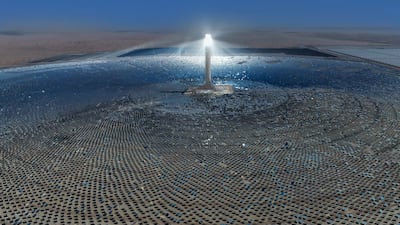The Dubai Electricity and Water Authority (Dewa) reported a 14.6 per cent increase in its fourth-quarter profit, boosted by higher demand for the utility’s electricity, water and cooling services amid continued growth momentum in the emirate.
Profit before other comprehensive income in the three months to the end of December climbed to Dh1.8 billion ($490 million), Dewa said on Thursday in a statement to the Dubai Financial Market, where its shares are traded.
The company’s revenue rose 5.5 per cent annually to Dh7.1 billion.
Dewa’s total power generation in the fourth quarter reached 13.4 terawatt-hours, up nearly 8 per cent over the same period in 2022.
Desalinated water production in the latest reported quarter reached 36.2 billion imperial gallons, a 5.3 per cent increase over the same period a year earlier.
Dewa said it added 11,163 customers in the fourth quarter, with total customers exceeding 1.2 million.
Dubai, one of the main commercial, tourism and financial hubs of the Middle East, has maintained growth momentum since bouncing back from the pandemic-driven slowdown.
Demand for water, electricity and cooling services in Dubai is rising amid the emirate's economic resurgence and population growth.
The emirate is continuing to witness strong population growth, with an addition of 100,240 residents in 2023. The city currently has more than 3.65 million residents, as per Dubai Statistics Centre.
Dubai’s economy expanded by an annual 3.3 per cent in the first nine months of last year, driven by growth in the emirate's tourism and transportation sectors, government data showed in January.
For the full-year 2023, Dewa recorded a 1.4 per cent drop in net profit to Dh7.9 billion despite a 7 per cent increase in revenue to record Dh29.2 billion.
The company said demand for electricity soared to a high of 56.5 terawatt-hours last year, marking a 6.3 per cent increase over 2022.
Clean power accounted for 11 per cent of the total electricity generated in 2023, the utility said.
“We have delivered significant results and record-breaking milestones for Dewa. We have achieved the highest annual revenue and operating profit in Dewa’s history,” said Saeed Al Tayer, managing director and chief executive of Dewa.
“I am optimistic about our operating and financial outlook for 2024 and beyond.”
The UAE, Opec's third-largest producer, has been investing heavily in clean energy projects, ranging from nuclear to solar, to achieve net-zero emissions by 2050.
Last year, Dewa joined forces with Dubai-based Emirates National Oil Company to develop and operate a joint integrated pilot project for the use of hydrogen in mobility.
Dewa may also explore a project involving batteries this year as the share of renewable energy increases in the Dubai utility’s overall mix, Mr Al Tayer said in November.
One of Dewa’s key renewable energy projects is the Mohammed bin Rashid Al Maktoum Solar Park, the largest single-site solar park in the world.
It has a planned production capacity of 5,000 megawatts by 2030 using solar photovoltaic panels and concentrated solar power with total investments of Dh50 billion.
When completed, the solar park is expected to reduce 6.5 million tonnes of carbon emissions annually.
“Our strategy, growth pillars and capital commitments are well positioned to deliver on our energy transition ambitions,” Mr Al Tayer said.





